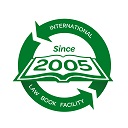
A trip in March to Nepal to visit my daughter gave me the chance to visit the Central Law Library in Kathmandu. I was very pleased to meet the Chief Librarian, Mr Subedi and his assistant, Mr Pokharel and to find out more about the Library.
 Mr Pokharel, Assistant Librarian, Mr Subedi, Chief Librarian, Katrina Crossley trustee
Mr Pokharel, Assistant Librarian, Mr Subedi, Chief Librarian, Katrina Crossley trustee
The Central Law Library is situated in a prime position in Kathmandu, near the Supreme Court, the Parliament complex at Singha Durbar and the Nepal Bar Association. It overlooks Rani Pokhari, a 400-year old lake and temple complex built by King Pratap Malla in 1670.
The Library is housed in an historic building dating from 1924 and was originally a school. It subsequently housed the Supreme Court and Regional Court before becoming Nepal’s principal law library. The library is used by law students from Kathmandu and Pokhara Universities as well as judges, lawyers and academics. The library provides vital resources to support the rule of law and legal education in Nepal. The collection of books includes Nepal legal texts and case reports, UK legal texts including Halsbury’s Laws and the All England Law Reports, and relevant texts from the US and India. The ILBF and The Asia Foundation in the US and have donated significant numbers of books to the library.

The earthquake on 25th April 2015 and subsequent aftershocks caused major damage to the library and it is currently not able to be used to its full extent. Mr Subedi and Mr Pokharel gave me a tour of the Library and I could clearly see the damage which consists of extensive cracks to internal and external walls. Users are limited to the ground floor of the library: the building has been served with a notice indicating that it should only be used for brief entry to access content. On my visit to the Library, I saw users of the library on the ground floor, researching and reading – there is not much choice but to use the library.

The Library also wants to extend the availability of online resources for users of the library but the age and state of repair of the building makes this very difficult.
Mr Subedi and Mr Pokharel also showed me the garden at the back of the Library which has been planted with many flowers, as Mr Subedi says, ‘to give the library users a restful place to have a break from their research and their studies’.

It is hoped that the Library repairs can be funded soon so that the Library can continue its vital work providing essential resources for Nepal’s judges, lawyers, and students.
Katrina Crossley


